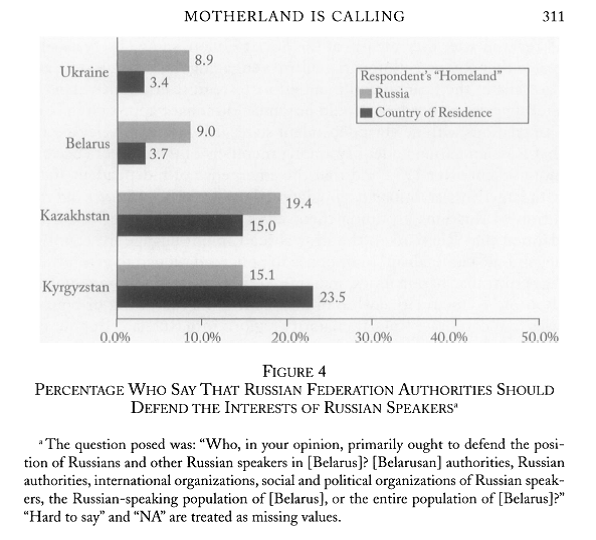How "Soviet" is the #Crimea #Referendum?
The Soviet Union, as a general practice, did not call public
votes on policy matters. The only exception to this rule was the 1991 vote on
preserving the union. If we think of the Crimea referendum as a vote on policy,
then it is not a particularly "Soviet" approach to engaging with the
public. However, thinking of the vote in these terms is probably faulty.
====================================================================
* Even this assertion is potentially problematic for Russian government elites. In a survey conducted a few years after Soviet collapse among Russian speakers in Belarus, Kazakhstan, Kyrgyzstan, and Ukraine, Lowell Barrington, Brian Silver, and I showed that Russians in the near abroad overwhelmingly opposed Russian state intervention on their behalf (Barrington, Herron, and Silver 2003). While several years have passed since those surveys were held, it is hard to develop a causal story that would flip ethnic Russian opinions in these regions.
[UPDATE: The relevant figure from our article is below.]
I reflected extensively on Soviet elections in my 2009 book,
Elections and Democracy after Communism?, emphasizing that there is no single
approach to elections across Soviet history. The earliest elections (1917-1936)
were characterized by substantial variation in practices, in part because the
Bolsheviks were in the process of establishing the USSR and also engaged in
internal struggles for authority finally resolved with Stalin's consolidation
of power. The middle period of elections (1936-1984) fits the stereotype of the
Soviet approach, with centralization of procedures and pre-ordained outcomes. The final stage of elections (1985-1991) was competitive but short-lived. Watching today's coverage of the Crimea Referendum reminded me of several passages from Chapter 2:
During most of the Soviet period, elections were analogous to elaborately staged theater. Soviet electoral practices required political actors to find appropriate candidates, ensure voter turnout, manage activities at polling stations, and troubleshoot problems. Moreover, these activities demanded substantial personnel, financial, material, and technical resources. Not only were citizens expected to vote, but millions of citizens served in a formal capacity during local and national campaigns as commission members, voter mobilizers, or candidates. Why would the Soviet Union direct so much effort to an enterprise with preordained outcomes?
…Soviet elections were designed for consumption by internal and external audiences. For the domestic audience, holding elections for local councils (soviets) continued the practices of limited enfranchisement that began in the tsarist period. By controlling suffrage and nomination, the Bolsheviks could eliminate challenges to their rule while offering the people what appeared to be a voice in public affairs. For the international audience, Soviet elections could showcase the state's "democratic" credentials and facilitate propaganda efforts aimed to discredit the democratic credentials of the West. Soviet propagandists asserted that electoral practices in the West, and especially the United States, were dominated by entrenched economic interests, discriminated against minority candidates and voters, and were plagued by bribery and fraud. In Soviet rubric, elections engaged the people directly in governance and were not compromised by the shortcomings commonly found in bourgeois societies.
In addition to legitimization, elections served several additional functions to strengthen the Soviet state. The election process allowed the leadership at the national, regional, and local levels to evaluate the performance of functionaries. The selection of "appropriate" candidates whose record of accomplishments reflected Soviet ideals, success in engaging voters and limiting expressions of dissent, and the overall management of large-scale mobilization conveyed information to higher-level officials who would make decisions about promotion (Carson 1955). While direct elections were not used to select major policymakers, the expansion of contestation rights and the reconfiguration of responsibilities for officials, particularly characteristic of the late Soviet period, could provide political actors access to positions where real policy decisions were made (Roeder 1993). Elections also habituated the population to participation in the Soviet system: casting a vote for a candidate was equivalent to supporting the regime (Gilison 1968; Roeder 1989).
As we await the official results, it is important to remember that the referendum is not about citizens expressing preferences on a policy outcome. Rather, it is a theatrical exercise designed to showcase its outcome: "proof" to others that Russians in the near abroad desire reunification with Russia.*…Turnout in second-era Soviet elections reflected the new emphasis on participation. By 1939, officially reported voter participation was nearly 100 percent, a level it would maintain during this period (Carson 1955; Swearer 1961). Several scholars have challenged the accuracy of official turnout results, suggesting that higher levels of nonparticipation were obscured by various techniques. Soviet officials did not report, nor did Western scholars have access to, reliable data on the number of citizens who did not register to vote, who obtained absentee certificates and did not use them, or the magnitude of data falsification (Zaslavsky and Brym 1978; Roeder 1989). All of these factors could explain the impressive turnout figures in Soviet elections, but coordinated mobilization efforts also encouraged citizens to cast ballots... Voters scheduled to be out-of-town obtained an absentee certificate allowing them to cast their ballots outside of their home precincts (Zaslavsky and Brym 1978). A public campaign praising candidates, and the direct intervention of agitators who visited voters and pressed citizens to come to the polls, also encouraged high levels of participation (Mote 1965; Gilison 1968; Hill 1976; Zaslavsky and Brym 1978).
====================================================================
* Even this assertion is potentially problematic for Russian government elites. In a survey conducted a few years after Soviet collapse among Russian speakers in Belarus, Kazakhstan, Kyrgyzstan, and Ukraine, Lowell Barrington, Brian Silver, and I showed that Russians in the near abroad overwhelmingly opposed Russian state intervention on their behalf (Barrington, Herron, and Silver 2003). While several years have passed since those surveys were held, it is hard to develop a causal story that would flip ethnic Russian opinions in these regions.
[UPDATE: The relevant figure from our article is below.]
